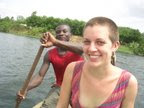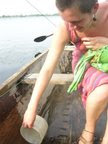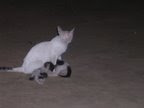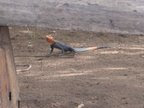 Elaine and I woke up and saw in the day light what the village looked like. This was Madame's house, made of cement and painted a cheerful yellow color. It was definitely the nicest house around, as they ranged down to mud and thatch huts, which also looked quite comfortable. Still, when the rainy season comes, it must be nice to know that you have a tin roof over your head and your house isn't going to melt around you.
Elaine and I woke up and saw in the day light what the village looked like. This was Madame's house, made of cement and painted a cheerful yellow color. It was definitely the nicest house around, as they ranged down to mud and thatch huts, which also looked quite comfortable. Still, when the rainy season comes, it must be nice to know that you have a tin roof over your head and your house isn't going to melt around you. We spent Friday touring around the village, and Senam showed us around one half of it. He knew everybody! It was crazy. He hasn't been here in years and everybody who we saw happily acknowledged us and talked to him. Elaine and I don't speak Ewe (the local language) so the typical routine went something like this: we would come up on a new place, the people would greet us in Ewe (Senam taught us how to say "How are you?" ("Ef oah"), "I'm fine" ("Ehhh" just like Fonzi would say it :-) ), and "thank you" ("Yo" with an extended "o") the only three phrases you really need in any community in Ghana), they would offer us a place to sit and they would talk to Senam in Ewe for some time while Elaine and I sat in silence or compared observations of the chickens and children running around or thinking about what it would be like to grow up in such a small community where the children in gangs are really mostly taking care of themselves.
We spent Friday touring around the village, and Senam showed us around one half of it. He knew everybody! It was crazy. He hasn't been here in years and everybody who we saw happily acknowledged us and talked to him. Elaine and I don't speak Ewe (the local language) so the typical routine went something like this: we would come up on a new place, the people would greet us in Ewe (Senam taught us how to say "How are you?" ("Ef oah"), "I'm fine" ("Ehhh" just like Fonzi would say it :-) ), and "thank you" ("Yo" with an extended "o") the only three phrases you really need in any community in Ghana), they would offer us a place to sit and they would talk to Senam in Ewe for some time while Elaine and I sat in silence or compared observations of the chickens and children running around or thinking about what it would be like to grow up in such a small community where the children in gangs are really mostly taking care of themselves. At one point we stopped by the house that Senam used to live in, and I took out my camera. I was spotted by a small group of kids and one of them, clearly under peer pressure, bravely stepped forward and asked if I would take a picture of him. I agreed, and he sat down. Right after, swarms of kids came from out of the woodwork and crowded into the shot. It was really cute, and, if you can't tell, Elaine joined them for a group shot.
At one point we stopped by the house that Senam used to live in, and I took out my camera. I was spotted by a small group of kids and one of them, clearly under peer pressure, bravely stepped forward and asked if I would take a picture of him. I agreed, and he sat down. Right after, swarms of kids came from out of the woodwork and crowded into the shot. It was really cute, and, if you can't tell, Elaine joined them for a group shot.We moved then down to the riverside, the source of life for the people here. When the government built the dam at Akosombo, they had to flood the upstream and downstream areas, which left Adidopke under water for some years. The villagers all moved up the hills abandoning everything because of the promise that they would have clean piped water and electricity (promises which have yet to be kept after over forty years). They have managed to survive because of the water that flows down the Volta and the seafood that lives in it.
 We went for a swim and a short canoe ride upstream, and sat by the bank before we returned home for lunch- rice with pepper sauce and little crawdads (we ate the shells and everything). Various cats and chickens squabbled at my feet looking for scraps.
We went for a swim and a short canoe ride upstream, and sat by the bank before we returned home for lunch- rice with pepper sauce and little crawdads (we ate the shells and everything). Various cats and chickens squabbled at my feet looking for scraps. We took a short walk through the other side of our village. One of the consequences of the river flood was the deposition of brilliantly white seashells in the ground everywhere. They are reminiscent of the shell mounds in California. Some townspeople were working to sift the sand and literally mine the shells, which are crushed and used to produce paint and white wash in bigger towns. We asked what the working conditions were like and got no answer, then asked a supervising man what the working hours were. He told us 7am-4pm, and when Elaine pointed out that it was almost 5 he muttered something about overtime. We lounged around and met more people of the village before we returned home and found out they had put a gas-powered generator on to make us more comfortable.
We took a short walk through the other side of our village. One of the consequences of the river flood was the deposition of brilliantly white seashells in the ground everywhere. They are reminiscent of the shell mounds in California. Some townspeople were working to sift the sand and literally mine the shells, which are crushed and used to produce paint and white wash in bigger towns. We asked what the working conditions were like and got no answer, then asked a supervising man what the working hours were. He told us 7am-4pm, and when Elaine pointed out that it was almost 5 he muttered something about overtime. We lounged around and met more people of the village before we returned home and found out they had put a gas-powered generator on to make us more comfortable.  The noise was so loud you couldn't hear anything, but groups of kids came from all over the place to see what could merit such an occasion. I was reading and Elaine was writing in her journal as the kids stared at us, but one brave one followed by others climbed up and started talking to us. I gave him and his friend my book to practice reading English. I then promptly remembered that the book was "The Adventures of Huckleberry Finn" written in southern slang, and I tried to get it back before I ruined the literacy rate of the village, but they were attached to it, looking at the cover and the maps of the US inside. Elaine started drawing in her journal and ripped out paper for the kids to do the same. Eventually the gas ran out and we went back to sleep.
The noise was so loud you couldn't hear anything, but groups of kids came from all over the place to see what could merit such an occasion. I was reading and Elaine was writing in her journal as the kids stared at us, but one brave one followed by others climbed up and started talking to us. I gave him and his friend my book to practice reading English. I then promptly remembered that the book was "The Adventures of Huckleberry Finn" written in southern slang, and I tried to get it back before I ruined the literacy rate of the village, but they were attached to it, looking at the cover and the maps of the US inside. Elaine started drawing in her journal and ripped out paper for the kids to do the same. Eventually the gas ran out and we went back to sleep.***
 The next day we walked to the next village (very similar) and caught a boat back across the river (Elaine occasionally bailed out the boat).
The next day we walked to the next village (very similar) and caught a boat back across the river (Elaine occasionally bailed out the boat).  We took a taxi to the town of Bator, the largest town around. Senam kept saying "Theo, this is Bator. Have you seen it? Yeah." He has a lot of little expressions that make us all smile. On the way we passed this tro-tro. They always have something written on the back, but I particularly liked this one: "Pray until something happens".
We took a taxi to the town of Bator, the largest town around. Senam kept saying "Theo, this is Bator. Have you seen it? Yeah." He has a lot of little expressions that make us all smile. On the way we passed this tro-tro. They always have something written on the back, but I particularly liked this one: "Pray until something happens".
 When we got to Bator, we met an old friend of Senam's named Fortune (some Ghanaians pick their own Western names so while many call themselves biblical names like Isaac or Mary, some have more creative names like Precious). She was very sweet, gave us water (a good sign in a host) and walked with us until we got to the bank where she works. We then continued on until we got to the river side and saw people just carrying sand in baskets on their heads. It was here we met Simple, another of Senam's friends who owns about half of the land in Bator.
When we got to Bator, we met an old friend of Senam's named Fortune (some Ghanaians pick their own Western names so while many call themselves biblical names like Isaac or Mary, some have more creative names like Precious). She was very sweet, gave us water (a good sign in a host) and walked with us until we got to the bank where she works. We then continued on until we got to the river side and saw people just carrying sand in baskets on their heads. It was here we met Simple, another of Senam's friends who owns about half of the land in Bator.
 He brought us a bunch of bananas and we ate them outside next to this rack of pig jaws that he has saved from the pigs he has hunted and eaten.
He brought us a bunch of bananas and we ate them outside next to this rack of pig jaws that he has saved from the pigs he has hunted and eaten.
We sat by the river for a little while talking before Simply decided he would just take off from work.
 We walked to a bar in town and were treated to quite a lot of drinks and snacks. It is considered rude to turn down food or drink in Ghana, but right when we finished something another drink would come out, so we ended up nursing drinks until it was time to go. Simple had hired a private photographer to come and take a picture of all of us together (which was odd, and made both of us feel a little like a fancy decoration to be shown off later). It also made me extremely uncomfortable to spend the afternoon with somebody who has so much and managed an operation of laborers carrying really heavy sand to trucks for construction in Accra in the hot sun all day. We eventually left and returned
We walked to a bar in town and were treated to quite a lot of drinks and snacks. It is considered rude to turn down food or drink in Ghana, but right when we finished something another drink would come out, so we ended up nursing drinks until it was time to go. Simple had hired a private photographer to come and take a picture of all of us together (which was odd, and made both of us feel a little like a fancy decoration to be shown off later). It also made me extremely uncomfortable to spend the afternoon with somebody who has so much and managed an operation of laborers carrying really heavy sand to trucks for construction in Accra in the hot sun all day. We eventually left and returned
 to Adidopke by boat, but this one had a cool sail made out of old flour sacks. Reduce, reuse, recycle. It looked like it really helped a lot too.
to Adidopke by boat, but this one had a cool sail made out of old flour sacks. Reduce, reuse, recycle. It looked like it really helped a lot too.
 The next day we walked to the next village (very similar) and caught a boat back across the river (Elaine occasionally bailed out the boat).
The next day we walked to the next village (very similar) and caught a boat back across the river (Elaine occasionally bailed out the boat).  We took a taxi to the town of Bator, the largest town around. Senam kept saying "Theo, this is Bator. Have you seen it? Yeah." He has a lot of little expressions that make us all smile. On the way we passed this tro-tro. They always have something written on the back, but I particularly liked this one: "Pray until something happens".
We took a taxi to the town of Bator, the largest town around. Senam kept saying "Theo, this is Bator. Have you seen it? Yeah." He has a lot of little expressions that make us all smile. On the way we passed this tro-tro. They always have something written on the back, but I particularly liked this one: "Pray until something happens". When we got to Bator, we met an old friend of Senam's named Fortune (some Ghanaians pick their own Western names so while many call themselves biblical names like Isaac or Mary, some have more creative names like Precious). She was very sweet, gave us water (a good sign in a host) and walked with us until we got to the bank where she works. We then continued on until we got to the river side and saw people just carrying sand in baskets on their heads. It was here we met Simple, another of Senam's friends who owns about half of the land in Bator.
When we got to Bator, we met an old friend of Senam's named Fortune (some Ghanaians pick their own Western names so while many call themselves biblical names like Isaac or Mary, some have more creative names like Precious). She was very sweet, gave us water (a good sign in a host) and walked with us until we got to the bank where she works. We then continued on until we got to the river side and saw people just carrying sand in baskets on their heads. It was here we met Simple, another of Senam's friends who owns about half of the land in Bator. He brought us a bunch of bananas and we ate them outside next to this rack of pig jaws that he has saved from the pigs he has hunted and eaten.
He brought us a bunch of bananas and we ate them outside next to this rack of pig jaws that he has saved from the pigs he has hunted and eaten.We sat by the river for a little while talking before Simply decided he would just take off from work.
 We walked to a bar in town and were treated to quite a lot of drinks and snacks. It is considered rude to turn down food or drink in Ghana, but right when we finished something another drink would come out, so we ended up nursing drinks until it was time to go. Simple had hired a private photographer to come and take a picture of all of us together (which was odd, and made both of us feel a little like a fancy decoration to be shown off later). It also made me extremely uncomfortable to spend the afternoon with somebody who has so much and managed an operation of laborers carrying really heavy sand to trucks for construction in Accra in the hot sun all day. We eventually left and returned
We walked to a bar in town and were treated to quite a lot of drinks and snacks. It is considered rude to turn down food or drink in Ghana, but right when we finished something another drink would come out, so we ended up nursing drinks until it was time to go. Simple had hired a private photographer to come and take a picture of all of us together (which was odd, and made both of us feel a little like a fancy decoration to be shown off later). It also made me extremely uncomfortable to spend the afternoon with somebody who has so much and managed an operation of laborers carrying really heavy sand to trucks for construction in Accra in the hot sun all day. We eventually left and returned to Adidopke by boat, but this one had a cool sail made out of old flour sacks. Reduce, reuse, recycle. It looked like it really helped a lot too.
to Adidopke by boat, but this one had a cool sail made out of old flour sacks. Reduce, reuse, recycle. It looked like it really helped a lot too. That night we had a fire outside with some of Senam's friends like Zach and really focused on his cats. There are three kittens by the momma cat, and Elaine and I ended up telling cat stories to each other. We then all crashed and spent our last night in the village.
That night we had a fire outside with some of Senam's friends like Zach and really focused on his cats. There are three kittens by the momma cat, and Elaine and I ended up telling cat stories to each other. We then all crashed and spent our last night in the village. When we woke up the next morning, we had our traditional breakfast of bread with peanut butter (called "groundnut paste" here, and we see people actually mashing the nuts. It looks tough, but the result is amazingly delicious for peanut butter), tea, cream and sugar. We said goodbye to Madame, to her helper in this photo with Elaine who refused to tell us her name out of shyness, and to Madame's church group (called the Amens by the townspeople because they say "Amen" so often). We gathered in a group to pour a libation of local gin to the gods to pray for a safe journey home, which involved each of us taking a shot at 9:30am. We got a taxi to a junction and tried to hail a tro-tro there, but it took a long time because they were mainly filled up. We eventually got back to Tema, had another lunch with Mary who was very kind to us and noticed my watch band was broken so she had it stitched up. We then were instructed to have another lunch time shot of gin to express gratitude for our safe arrival, and then Senam found us a tro-tro back to Legon while he boarded a different one to his university. Elaine and I rode home mostly in silence absorbing what it felt like to live for a few days in a really small village with no electricity where very little changes, but where the people all knew each other and where they lived so well. It was really an amazing sight. But in some ways, it was nice to be back in Legon where each day is different and new things happen.
When we woke up the next morning, we had our traditional breakfast of bread with peanut butter (called "groundnut paste" here, and we see people actually mashing the nuts. It looks tough, but the result is amazingly delicious for peanut butter), tea, cream and sugar. We said goodbye to Madame, to her helper in this photo with Elaine who refused to tell us her name out of shyness, and to Madame's church group (called the Amens by the townspeople because they say "Amen" so often). We gathered in a group to pour a libation of local gin to the gods to pray for a safe journey home, which involved each of us taking a shot at 9:30am. We got a taxi to a junction and tried to hail a tro-tro there, but it took a long time because they were mainly filled up. We eventually got back to Tema, had another lunch with Mary who was very kind to us and noticed my watch band was broken so she had it stitched up. We then were instructed to have another lunch time shot of gin to express gratitude for our safe arrival, and then Senam found us a tro-tro back to Legon while he boarded a different one to his university. Elaine and I rode home mostly in silence absorbing what it felt like to live for a few days in a really small village with no electricity where very little changes, but where the people all knew each other and where they lived so well. It was really an amazing sight. But in some ways, it was nice to be back in Legon where each day is different and new things happen.
As a post-script, I finally got a good picture of the crazy lizards that are everywhere here. This is what they look like :-)

No comments:
Post a Comment